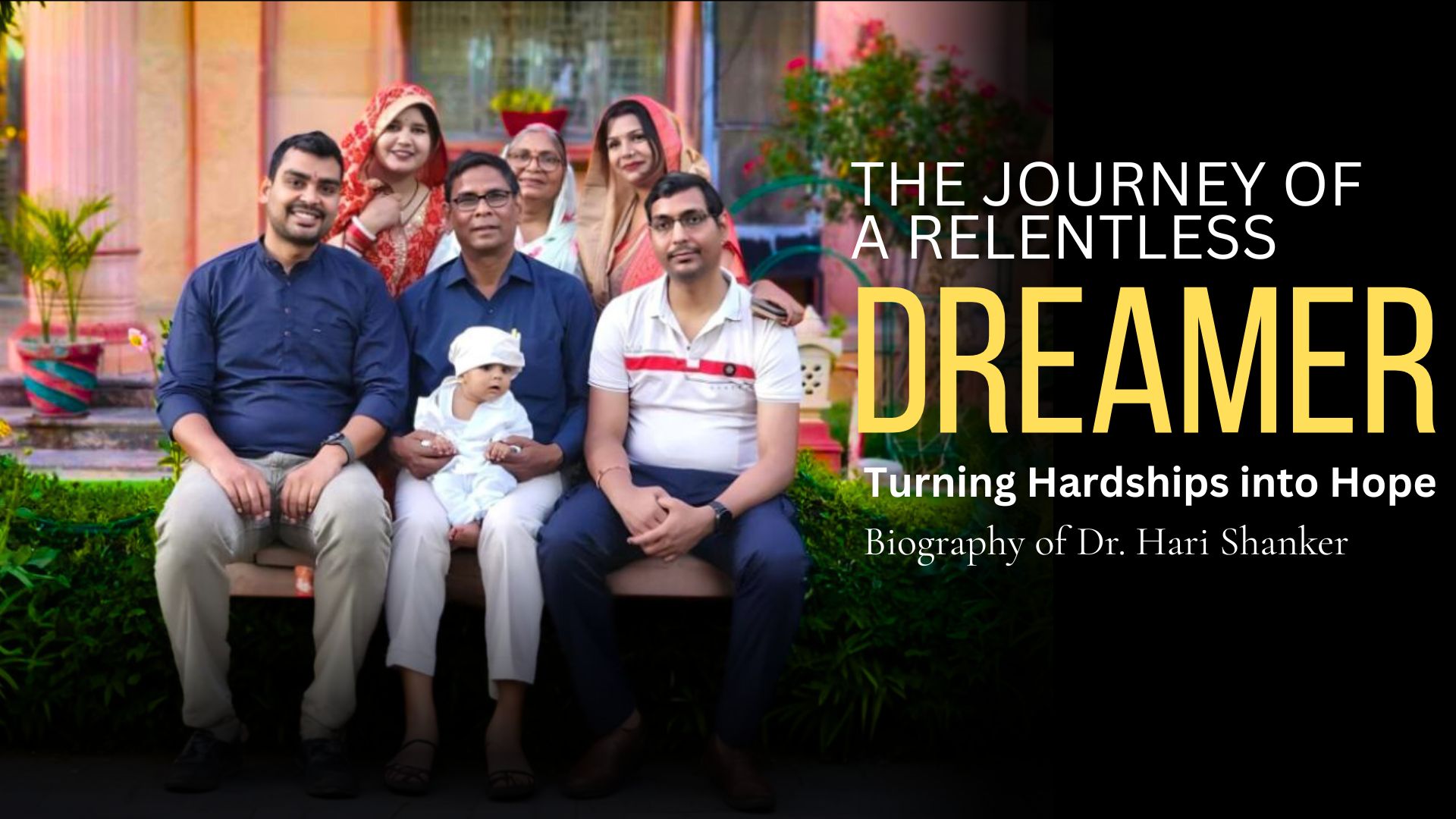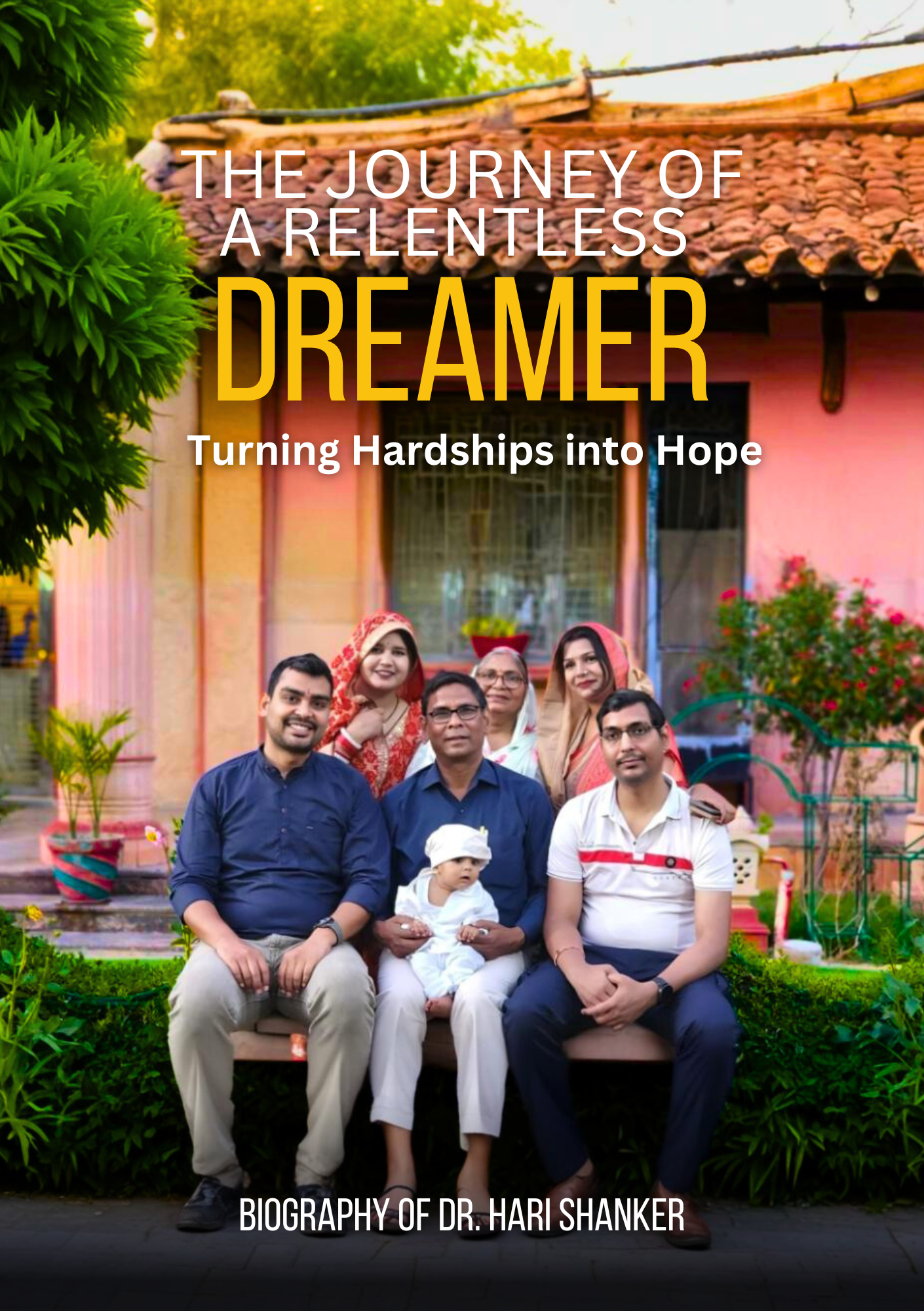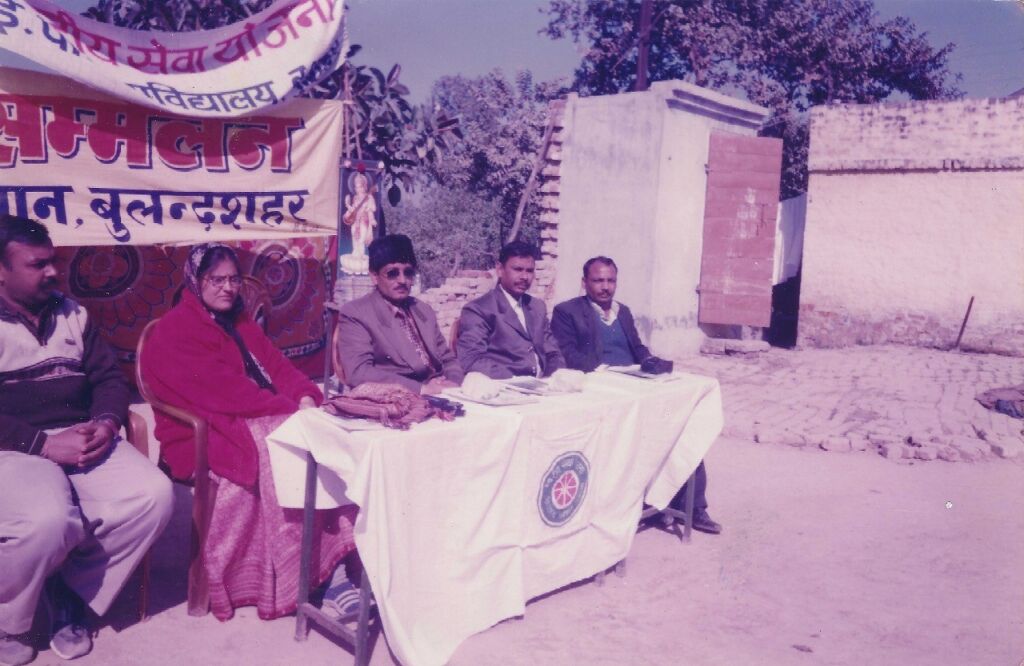

“The moment you start thinking about what other people and other artists think, you’re going to start writing like other people.” -– Rex Orange County
Dedication
This biography is lovingly dedicated to my father, Mr. Moti Singh Sen,
the pillar of strength who carried the weight of an entire family on his shoulders with grace, grit, and unshakable resolve. You were the only earning hand, yet you never let us feel the heaviness of hardship. Your quiet sacrifices, your belief in the power of education, and your steadfast love are the roots from which my journey grew. Every step I took toward knowledge was a reflection of your labor, your dreams, and your values.
To my mother,
whose boundless patience and unwavering devotion formed the moral compass of my life. In your silence, I found resilience. In your care, I found courage. You are the quiet force behind everything I have become—the soul of our home, the one who stood like a lighthouse during every storm. This story, in all its spirit and struggle, is as much yours as it is mine.
To my two sons, Kapil Kumar and Sachin Kumar,
you are my hope, my pride, and my inspiration to keep going. Watching you grow into thoughtful, compassionate individuals has been my life’s greatest joy. You gave meaning to every sleepless night and every early morning spent building something from nothing. You are my legacy, not in name alone, but in purpose, service, and love. May you always carry forward the values of humility, hard work, and humanity.
To my entire extended family,
who supported my pursuit of education and purpose through the most difficult of times, I am deeply grateful. Your belief gave me wings when I could barely stand. Every chapter of this biography is a tribute to the strength we found in one another.
And to every child who walks barefoot to school, every youth who dreams against the odds, and every soul who dares to teach when no one listens—this story is for you. May you see in these pages the truth that your beginning does not define your ending. Let this be proof that from the narrowest lanes, the brightest lights can emerge.
— Dr. Hari Shanker

Phase 1: From Dusty Roads to Distant Dreams
“One can have no smaller or greater mastery than mastery of oneself.” - Leonardo da Vinci

Dr. Hari Shanker was born on July 7, 1970, in the small but bustling village of Bulandshahr, Uttar Pradesh. Born into a humble household as the only son among four sisters, Dr. Hari Shanker’s early years were shaped by a family environment filled with love but strained by poverty. His father, the sole breadwinner, worked tirelessly to provide for the family, while his mother, a devoted homemaker, stitched together every ounce of hope and courage to support her children’s dreams.
Life was far from easy. In their modest home, luxuries like electricity, running water, and comfortable furniture were things heard about but rarely seen. Meals were simple, sometimes scarce, and childhood games were played barefoot on sun-baked village paths. Despite these hardships, Dr. Hari Shanker remembers his childhood as a time of quiet strength, shaped by watching his father’s relentless work ethic and his mother’s enduring patience.
Education, for most children in Dr. Hari Shanker’s village, was a distant dream—especially for someone whose family couldn’t afford school shoes, let alone books or tuition. But even as a child, Dr. Hari Shanker showed a spark that couldn’t be dimmed. He was inquisitive, hungry to learn, and determined not to let his circumstances define him.
The nearest school was several kilometers away, and with no money for transport, he walked long distances, sometimes cycling barefoot, enduring the biting cold of North Indian winters and the blazing heat of summers just to sit in a classroom.
Riding a bicycle without shoes on frost-covered roads, Dr. Hari Shanker’s feet would sometimes ache so badly he had to stop and walk. Yet he never considered giving up. He carried not just his books on the bicycle’s rusted frame, but also the weight of his family’s dreams and his own unshakable belief that education could change his life.
After completing his 12th grade, he began teaching in a local school—both as a means of supporting his family and funding his further studies. Balancing his role as a teacher and a student wasn’t easy, but Dr. Hari Shanker had already learned the value of time and perseverance. He taught during the day and studied at night, often by the dim light of a lantern. In those long nights, he dreamed not of wealth or status, but of uplifting others like himself—people who had the spark but not the means.
His first formal skill training came through the TRYSEM scheme (Training of Rural Youth for Self Employment), where he learned shorthand and typing. These were not just new skills—they were lifelines to opportunity. For Dr. Hari Shanker, mastering the typewriter and shorthand symbols felt like learning a new language, one that promised a better future.
Phase 2: A Pen Against the Odds
“The aim of art is to represent not the outward appearance of things, but their inward significance.”– Aristotle

When the winds of change began to blow through the village thanks to Dr. Hari Shanker’s educational revolution, it was clear he was not just teaching people to read—he was rewriting their destiny. But his own story was still unfolding. With the foundation of adult education laid and recognition beginning to trickle in, Dr. Hari Shanker found himself at a crossroads. The question was no longer “Can I rise above poverty?” It became “How much farther can I go?”
Even with his accomplishments, Dr. Hari Shanker had not stopped learning. The boy who once cycled barefoot in the cold was now a young man pursuing a Bachelor of Commerce (B.Com) degree. Every rupee he earned went into funding his education. Nights were filled with ledgers, textbooks,
And balance sheets, while days were split between teaching, organizing adult literacy classes, and managing village hostility that still lingered in some corners.
His resilience was nothing short of remarkable. Unlike many who saw degrees as tickets to urban jobs and secure government posts, Dr. Hari Shanker saw his education as an amplifier of service. Every chapter he studied in commerce, every line he typed, and every word he took down in shorthand was not just for him—it was fuel for a growing movement. He had already seen the power of education in transforming the lives of the elderly in his village. Now, he was preparing to carry that vision even further.
It was around this time that Dr. Hari Shanker enrolled in a B.Ed. program at C.C.S. University, Meerut, in 1996. For a boy who had grown up with no resources, entering university life was both exhilarating and overwhelming. He was often older than his peers, and his humility sometimes made him an outsider. But education had taught him patience, and his inner compass kept him focused.
He completed his Basic Training Certificate (BTC) in education from the Education Department in Allahabad, adding yet another qualification to his expanding arsenal.
But Dr. Hari Shanker’s thirst for knowledge wasn’t confined to the classroom. Recognizing the importance of technology in a rapidly changing world, he earned a Postgraduate Diploma in Computers from the Institute of Computer Research, Bulandshahr. To many in his village, computers were mysterious machines reserved for city offices. Hari wanted to break that myth. He not only learned how to use them but later introduced basic computer literacy in his educational centers—a revolutionary idea in rural Uttar Pradesh at the time.
Every skill he acquired was like a new thread in a larger tapestry. He also completed a Six-Month Diploma in Office Management from Janta Polytechnic, Jahangirabad Bahipur, which allowed him to efficiently manage his expanding educational activities. His exposure continued with a Six-Month Training by the Training & Employment Directorate in Lucknow and a Three-Week Business Development course from the District Industry Center, Bulandshahr. These programs sharpened his understanding of economic development and self-sustenance—lessons he would later impart to thousands through his educational initiatives.
In 2006, he crowned his academic journey with a Master’s Degree in Human Rights from the Indian Institute of Human Rights, New Delhi. For a man who had once battled poverty and ridicule, studying human rights was deeply personal. He had lived through injustice, seen the pain of denied opportunities, and now, he was gaining the legal and ethical knowledge to defend and uplift the voiceless.
Phase 3: Lighting a Hundred Lamps
“The artist’s world is limitless. It can be found anywhere, far from where he lives or a few feet away. It is always on his doorstep.” – Paul Strand

By the early 2000s, Dr. Hari Shanker was no longer just a teacher or a local youth with a vision—he had become a beacon of transformation in Bulandshahr and its neighboring districts. What began as a one-man effort to educate elderly villagers had evolved into something much larger: a mission to bring education to the doorsteps of those who had been denied it for generations.
The turning point came in 2001, when Dr. Hari Shanker officially joined as a Government Teacher, a role that gave him both structure and reach. Teaching children aged 6 to 12, he finally had a platform to create lasting change in a formal setting. But Dr. Hari Shanker was never one to limit himself to the boundaries of a classroom.
He approached this role with the precision of a reformer and the heart of a caretaker. He quickly became known for creating an environment that was not only educational but nurturing—a place where children felt safe, respected, and inspired. Understanding the holistic needs of children, especially those from marginalized backgrounds, Dr. Hari Shanker initiated systems for mid-day meal preparation and distribution, ensuring no child studied on an empty stomach.
Dr. Hari Shanker’s compassion extended to every corner of the school. He took the time to teach self-help skills like personal hygiene and dressing—life skills that many overlooked but were vital for the all-round development of children. He introduced interactive learning, making creative use of limited resources. Whether it was constructing learning corners, using storytelling for behavioral education, or painting with syrup and homemade colors, every activity was designed to make learning joyful and memorable.
What truly set Dr. Hari Shanker apart was his ability to foster trust and communication not just with children, but with their parents and the wider community. In an era when parent-teacher interaction was minimal in rural schools, Dr. Hari Shanker pioneered structured feedback systems, regular interviews, and home visits. His notes and verbal reports became windows into a child’s world, helping families understand and support their children’s growth.
But Dr. Hari Shanker’s vision refused to be confined.
In 2005, he transitioned to a District Coordinator role—a move that shifted his focus from individual classrooms to community-wide change. This position allowed him to scale his initiatives, and he took on the challenge with characteristic energy and commitment.
As a coordinator, Dr. Hari Shanker wore many hats. He developed partnerships with government departments, NGOs, donor agencies, and banks, forming a network of support for participatory development. He was no longer just an educator; he was a bridge between policy and people, translating complex programs into meaningful action at the grassroots level.